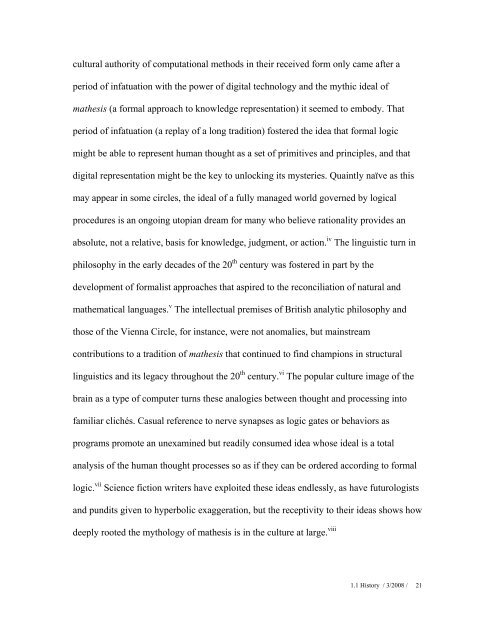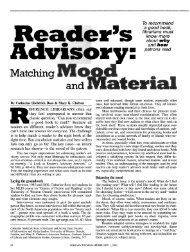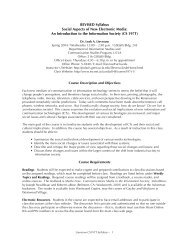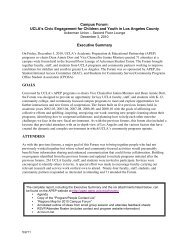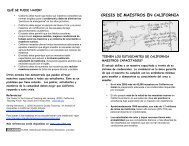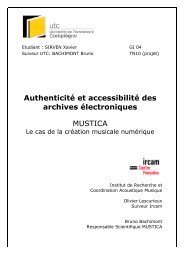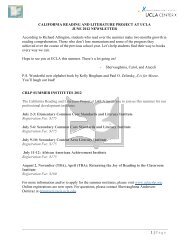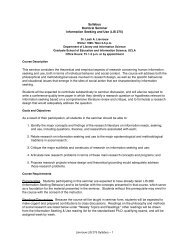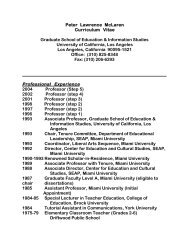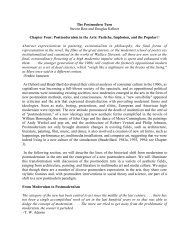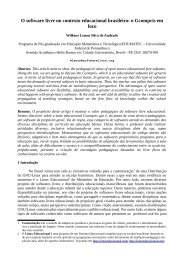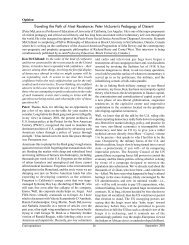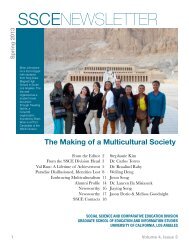1.1 From Digital Humanities to Speculative Computing - UCLA ...
1.1 From Digital Humanities to Speculative Computing - UCLA ...
1.1 From Digital Humanities to Speculative Computing - UCLA ...
You also want an ePaper? Increase the reach of your titles
YUMPU automatically turns print PDFs into web optimized ePapers that Google loves.
cultural authority of computational methods in their received form only came after a<br />
period of infatuation with the power of digital technology and the mythic ideal of<br />
mathesis (a formal approach <strong>to</strong> knowledge representation) it seemed <strong>to</strong> embody. That<br />
period of infatuation (a replay of a long tradition) fostered the idea that formal logic<br />
might be able <strong>to</strong> represent human thought as a set of primitives and principles, and that<br />
digital representation might be the key <strong>to</strong> unlocking its mysteries. Quaintly naïve as this<br />
may appear in some circles, the ideal of a fully managed world governed by logical<br />
procedures is an ongoing u<strong>to</strong>pian dream for many who believe rationality provides an<br />
absolute, not a relative, basis for knowledge, judgment, or action. iv The linguistic turn in<br />
philosophy in the early decades of the 20 th century was fostered in part by the<br />
development of formalist approaches that aspired <strong>to</strong> the reconciliation of natural and<br />
mathematical languages. v The intellectual premises of British analytic philosophy and<br />
those of the Vienna Circle, for instance, were not anomalies, but mainstream<br />
contributions <strong>to</strong> a tradition of mathesis that continued <strong>to</strong> find champions in structural<br />
linguistics and its legacy throughout the 20 th century. vi The popular culture image of the<br />
brain as a type of computer turns these analogies between thought and processing in<strong>to</strong><br />
familiar clichés. Casual reference <strong>to</strong> nerve synapses as logic gates or behaviors as<br />
programs promote an unexamined but readily consumed idea whose ideal is a <strong>to</strong>tal<br />
analysis of the human thought processes so as if they can be ordered according <strong>to</strong> formal<br />
logic. vii Science fiction writers have exploited these ideas endlessly, as have futurologists<br />
and pundits given <strong>to</strong> hyperbolic exaggeration, but the receptivity <strong>to</strong> their ideas shows how<br />
deeply rooted the mythology of mathesis is in the culture at large. viii<br />
<strong>1.1</strong> His<strong>to</strong>ry / 3/2008 /<br />
21


